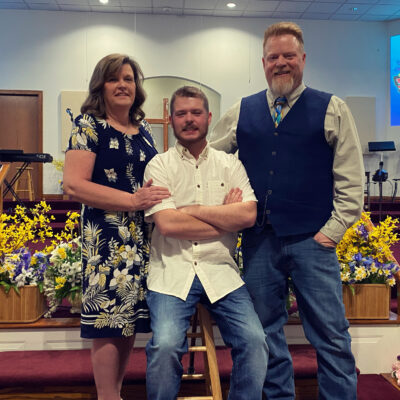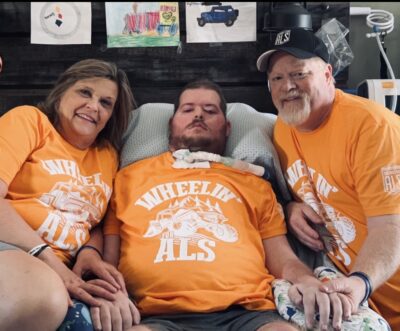Meet Jacob
When 23-year-old Jacob Harper from Winfield, West Virginia, first heard the words “You have ALS,” in March 2022, he and his father sat in shock. Neither had a clear understanding of what the diagnosis meant. His mother, however, turned pale—she knew the weight of those three letters. Amyotrophic lateral sclerosis, or ALS, is a relentless disease. For Jacob, it was not just ALS but an ultra-rare genetic version, linked to the P525L FUS mutation. Doctors told him to expect only one to three years.
but an ultra-rare genetic version, linked to the P525L FUS mutation. Doctors told him to expect only one to three years.
Jacob, once an avid outdoorsman who loved hunting, fishing, and working as a machinist and a welder, suddenly faced a future of increasing paralysis and loss. Yet, through determination, faith, and access to an experimental drug called ION363—nicknamed “Jacifusen”—he has lived beyond those initial predictions. Even as the disease advanced, Jacob and his family found new ways to fight for quality of life.
One of the most unexpected breakthroughs came not from a drug or machine, but from a pair of lenses.
Losing the ability to communicate
As ALS progressed, Jacob eventually lost the ability to move his eyes. He could no longer blink, and his eyelids wouldn’t stay open. Severe dry eye followed, leaving his eyes painfully irritated and threatening to take away his ability to watch television, enjoy car rides, or even communicate. At times, his parents resorted to using cosmetic tape to hold his eyelids open. It was an exhausting, imperfect solution that underscored how fragile his remaining independence had become.
How scleral lenses help ALS patients retain communication longer
Enter scleral lenses. Traditionally used for patients with corneal disease or extreme dry eye, these specialized contact lenses are larger than normal and vault over the eye, creating a reservoir of fluid that bathes the cornea. Jacob’s care team at The Ohio State University had never tried them in someone with ALS before, but they were willing to innovate. Working with Dr. Stephanie Pisano and her team, including a dedicated resident, Dr. Shihij Takoo, Jacob went through multiple fittings to find lenses that worked. They had to account for astigmatism, depth, and comfort, making careful adjustments along the way.
The impact was immediate. With the scleral lenses in place, Jacob’s eyes could stay open and moist, protected from damage and discomfort. Combined with cosmetic tape, the lenses allowed him to keep his eyes open long enough to enjoy daily life again and, most importantly, stay engaged with the people he loves. His father calls the lenses “a blessing,” explaining, “I don’t know what we would do if it had not been for the scleral lenses. In a world where we had already lost almost everything, and we only had communication left, these lenses made sure we were able to hang on to this piece of dignity.”
Maintaining dignity

Communication is one of the cruelest battlegrounds in ALS. Before his eye paralysis, Jacob was lightning-fast on an eye-gaze computer system, astonishing his speech therapist with his speed. He could email, text, and even shop online almost as quickly as before his diagnosis. In fact, it was almost as if his family could have regular conversations with Jacob. As his voice deteriorated, Jacob’s family connected with Bridging Voice, a nonprofit based in New York City, who assists ALS families with communication technology. They were put in touch with ElevenLabs, who uses clips of a person’s voice to create an electronic voice. Using videos, they created an AI duplicate that sounded almost identical to Jacob.
When he lost the ability to move his eyes, that option disappeared. Today, he communicates using a neuro-node system connected to his leg muscles. Though slower, it still allows him to share his thoughts and direct his smart home devices. Today, scleral lenses make it possible for him to keep his eyes open, protected, and moisturized, allowing him to interact with his environment and preserve the vital connection between his mind and the outside world.
For the Harper family, the lenses are more than a medical tool. They are a bridge. They have enabled Jacob to remain present in everyday moments, whether watching movies with his parents, listening to vinyl records, or taking long drives, where his father straps him into his beloved Mustang and takes him out on the open road.
ALS is a disease defined by relentless loss: the loss of movement, speech, independence, and time. But in Jacob’s case, scleral lenses hit the pause button, allowing him to maintain communication longer. They offer comfort, vision, and dignity in the face of one of life’s harshest challenges. And in doing so, they keep open a window to the world that would have otherwise closed too soon.
Learn more about Jacob’s journey at www.TeamJacobWV.org